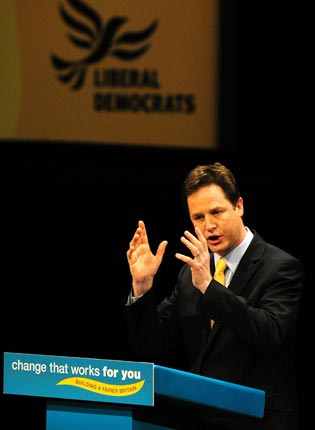Clegg quells dissent over choice of ally
Liberal Democrat leader tells his party they have a 'once-in-a-generation opportunity for real change'

Nick Clegg was forced to quell dissent from within his own ranks and fight off attempts by Labour and the Tories to woo his party yesterday, as he pleaded with voters to take a "once-in-a-generation opportunity for real change" at the next election.
Senior figures from the Government and the Tory frontbench had already made pitches for the Liberal Democrat leader's support in the event of a hung parliament by the time Mr Clegg gave his closing speech to his party's spring conference.
But in a defiant message to his political rivals, he said both major parties were "closer to confusion" than to his values. Mr Clegg, who delivered his address despite suffering from a sore throat, reserved his strongest attack for the Tories. He argued that David Cameron's team was behaving like a "protection racket" in warning voters that Britain's credit worthiness would plummet in the markets if they did not deliver a clear Conservative victory.
"David Cameron, George Osborne and Ken Clarke marched into the City of London the other day and declared that if voters didn't give them the result they want, the markets would tear the house down," he said.
"Cynical, desperate, the Tories think they're entitled to victory – the moment they feel it slipping from their grasp, they start lashing out. It's a political version of the protection racket – do what we want, or else."
Mr Clegg also took aim at the Tories over their support for Lord Ashcroft, the party's billionaire deputy chairman and donor who recently revealed he had not been paying tax on his overseas assets. The Tories had become "the world's first offshore political party" as a result of the £5m donated by Lord Ashcroft, he said. "How can David Cameron claim to clean up politics when he can't even clean up his own party deputy chairman. The label says made in Britain, but the money says made in Belize."
Mr Clegg called Labour the "party of many disasters" and used his speech to quash suggestions that he would cut a secret deal to deliver Mr Cameron or Gordon Brown to No 10. "Some days I read that we're planning a deal with Labour, some days that we're planning a deal with the Conservatives, other days that we'll refuse to talk to anyone at all," he said. "Yet, when all the speculation is said and done, I keep coming back to some simple truths. I am not the kingmaker, the 45 million voters of Britain are the kingmakers."
Delegates at the Birmingham conference had voiced concerns at the prospect of a coalition with Mr Cameron, a fear prompted by Mr Clegg's admission that the party winning greatest support from voters should be allowed to form a Government. He was also criticised by delegates for praising Baroness Thatcher in recent interviews. Aides to Mr Clegg said that party members would be consulted if the prospect of a formal coalition arose. "Any leader worth his salt would take his party with him," his spokeswoman said.
Polls continue to predict a hung parliament, with two suggesting over the weekend that Mr Cameron would not have a clear Commons majority after the next election. Support for the Liberal Democrats has so far defied expectations that it would be squeezed by the closeness of the race between Labour and the Tories. A poll for ICM put the Liberal Democrat support at 21 per cent, with YouGov putting them on 17 per cent.
Though Mr Clegg did not repeat his aim of becoming Prime Minister, an ambition which featured heavily in his autumn party conference speech, he set out the equally demanding target of claiming a third of the votes cast. "Almost one in four chose the Liberal Democrats at the last election. If that increased to one in three, we could lead the next Government," he said.
Join our commenting forum
Join thought-provoking conversations, follow other Independent readers and see their replies
0Comments